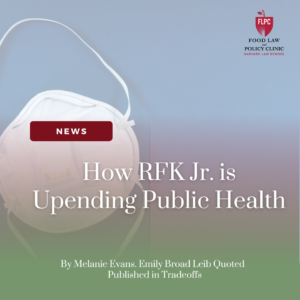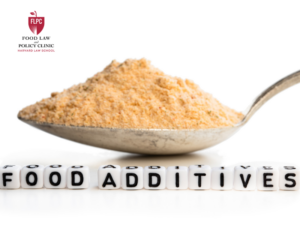By Heather Latino, Clinical Instructor
2023 was a momentous year for food waste policy. The U.S. Environmental Protection Agency (EPA) released its report finding that wasted food decaying in landfills is responsible for an alarming 58% of all municipal landfill methane emissions. The EPA also revealed its new Wasted Food Scale, ranking the most common methods of managing food waste from the most to least preferred based on current science, technological advances, and changes in operational practices. Then in December, the EPA, along with the U.S. Department of Agriculture and the U.S. Food and Drug Administration, released the first ever Draft National Strategy for Reducing Food Loss and Waste and Recycling Organics in the U.S. These developments are sure to shape the food waste policy landscape for years to come.
Just as food waste policy is getting increased attention at the national level, in 2023, legislators across 23 states worked to introduce 91 unique bills targeting the prevention and reduction of food loss and waste in their communities. While many of these bills remained pending at the end of 2024, 23 bills were enacted into law with only 11 bills failing. Connecticut, Hawaii, and New York led states in the number of food waste bills that were under consideration in 2023, with the Connecticut legislature considering a remarkable 11 food waste bills last year. The top four policy areas for introduced legislation included:
- Tax incentives for food donations (18 bills)
- State grant funding or other investments in food waste prevention, recovery, or recycling (15 bills)
- Organic waste bans (10 bills)
- Waste reduction measures, such as setting waste diversion goals (10 bills)
Bills proposing food loss and waste reduction funding, along with bills targeting school food waste and proposed tax incentives for food donation were the most likely to pass.

Last year, we highlighted some of the new food waste laws that states enacted in the first half of 2023. Below is a sampling of some of the innovative bills that state legislators considered in 2023, which are still pending or recently passed.
- In an effort to address consumer confusion over food date labels, California, Massachusetts, and New Jersey are considering bills to mandate standardized food date labels. Many consumers do not realize that food date labels are generally intended to indicate freshness as opposed to food safety. This confusion leads consumers to prematurely toss perfectly edible food and accounts for about 7% of all consumer food waste. Although many consumers believe that the federal government regulates the date labels that they see on their foods, the federal government does not require or regulate food date labels (with the notable exception of infant formula). California is currently considering a joint resolution urging Congress and the President to implement a national solution by passing the Food Date Labeling Act, a bicameral, bipartisan bill introduced by Senator Blumenthal and Representatives Newhouse and Pingree.
- Organic waste disposal bans that restrict the amount of food waste that can be disposed of in landfills are one of the most effective tools that policymakers can use to change the way that food businesses and consumers manage food waste. Not only do bans focus the attention of food waste generators on food waste prevention and diversion, studies following the implementation of organic waste bans in Massachusetts and New York showed additional benefits, such as job creation and emissions reduction. Currently ten states have organic waste bans on the books and New Hampshire’s new 2023 waste ban is set to take effect in 2025. Recognizing the transformative power of organic waste bans, in March, legislators in Maine passed a bill banning food scrap disposal by commercial and industrial waste generators. The bill also requires that covered entities donate excess edible food to local food recovery organizations to the maximum extent possible. While the bill has passed both the house and senate, it is currently with the appropriations committee to determine if it can be funded.
- Pending legislation in Massachusetts also proposes promoting food donation by directing the Department of Public Health to issue guidance on food donation best practices, existing liability protections, and food donation tax incentives. In the 2023 session, Connecticut considered even stronger measures that would have required large food businesses to donate surplus, edible food. Though the 2023 bill did not pass, Connecticut legislators are working to move forward a bill that would require businesses generating more than 26 tons of organic waste to adopt a written food donation policy.
We hope to see more of these bills pass in 2024 and look forward to seeing how states integrate the Wasted Food Scale and an enhanced understanding of food waste’s warming impacts into state policy.
Explore existing food waste reduction policies on the Policy Finder, which now features state policies and guidance on food safety for food donation.


Health Law & Policy, Commentary
Federal Government Cuts Health Grants and Grantees File Litigation in Response
April 21, 2025